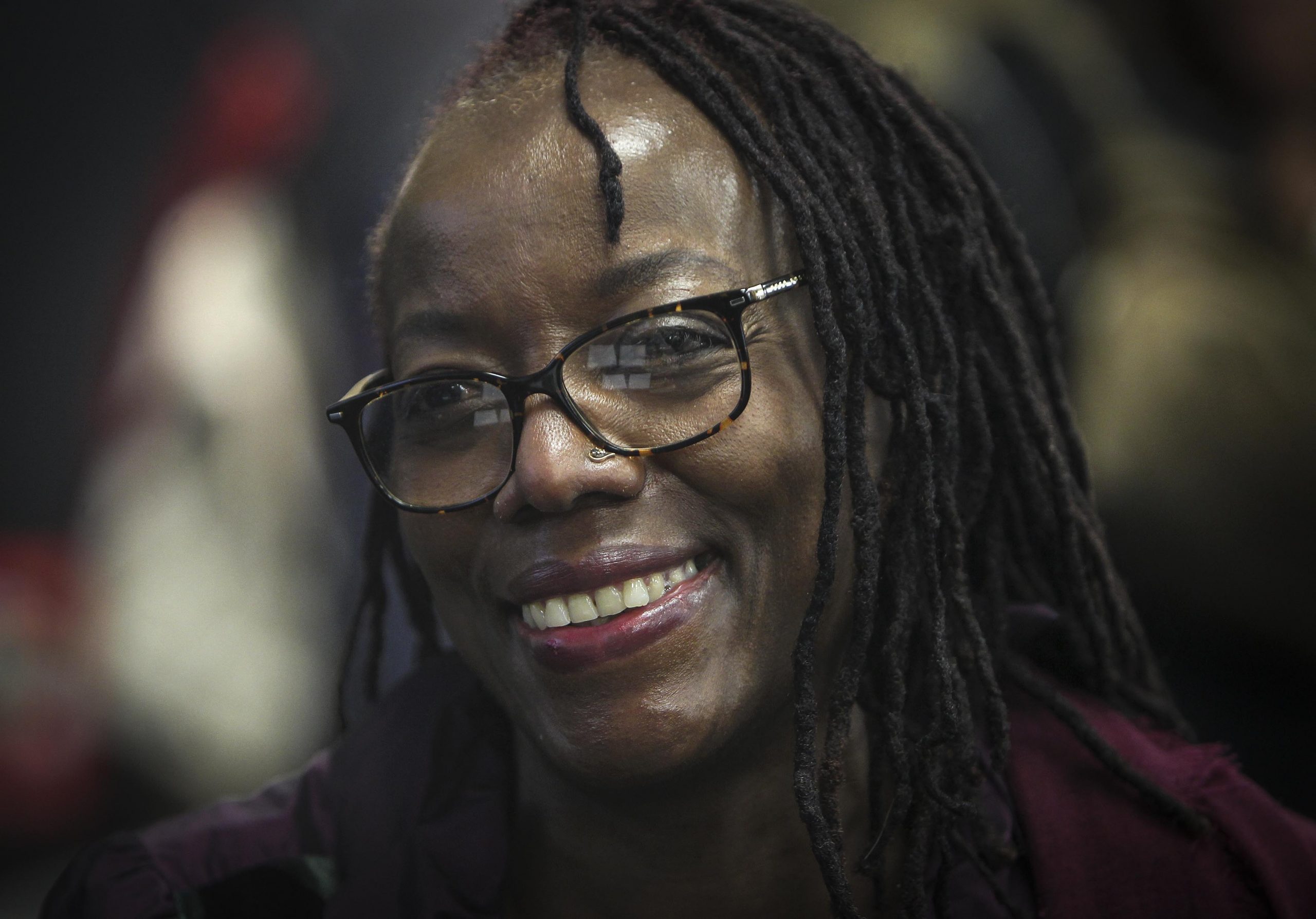Tsitsi Dangarembga’s art and activism
The artist and activist elaborates on her work and the intricate, necessary relationship between her artistic production and political action in Zimbabwe.
Author:
1 March 2021

The last week of July 2020 was one of extreme paradoxes for Tsitsi Dangarembga. Three days after her novel This Mournable Body was shortlisted for the prestigious Booker Prize, the Zimbabwean writer, playwright and filmmaker found herself in prison after her arrest in Harare. Dangarembga, part of a two-women protest, was standing next to a highway, silently holding a placard protesting against state corruption and the imprisonment of journalist Hopewell Chin’ono.
Dangarembga and her friend, Julie Barnes, were charged with incitement to participate in public violence and breaching anti-coronavirus regulations, even though they wore masks and maintained a sizable distance from each other. Dangarembga was released on bail after a night in jail. With the charges still pending against her despite an international outcry against her arrest, the writer received the PEN International Award for Freedom of Expression in January 2021. An international advocacy group concerned with the safety and freedom of expression of writers, PEN awarded the prize for Dangarembga’s “brave work as a writer, filmmaker and activist”, in response to her arrest.

In an online interview, Dangarembga welcomed the award as a “positive recognition of some of the work that I do in Zimbabwe, not only in the literary field but also the work that I do on the ground as a concerned citizen”. Though she regards her core work as artistic production, she feels compelled to do what she calls “on-the-ground” activism, as it is her duty as a citizen.
The pull to activism comes, however, at a price, siphoning off the energy she would normally expend on writing and film making into the day-to-day struggles against corruption, unconstitutional arrests and a lack of service delivery.
The PEN award also presents a conundrum. She admits to being “a little bit conflicted” about it channeling attention away from her artistic production to her political action, leaving a gap in which the important work of storytelling gets lost.
Yet looking the other way is not an option for the writer, who describes the injustices of her home country as a powerful “prompt to engagement”. Her lived experience as a Zimbabwean woman and the activism that springs from this position fuel her writing. She concedes that while there is a tension between the artistic work she wants to do and the activism she is forced to do, the two arenas dovetail. “The two go hand in hand because the issues that I take up with my body, as a concerned citizen, are the same issues that I weave into my narrative production,” says Dangarembga.
An enduring theme
Justice, or the miscarriage thereof, has been an enduring theme of Dangarembga’s fiction. This Mournable Body is the last in a trilogy that follows the life of an impoverished rural girl, Tambudzai, who has to fight – first gender discrimination in colonial Rhodesia and then racism in the newly independent Zimbabwe.
The first novel in the trilogy, Nervous Conditions, was published in 1988 when Dangarembga was 25 years old. It is the first published novel in English by a Black Zimbabwean woman and introduces us to the live wire Tambudzai, who is always questioning and then fighting against the gender hierarchy and her position in it. Denied the opportunity to go to school because she is a mere girl, Tambudzai grows her own maize crop to pay for her education. Her family mocks her ambition, with her father exhorting her to give up on the dream of education. “Can you cook books and feed them to your husband? Stay at home with your mother. Learn to cook and clean,” says the father. But Tambudzai defies the gender roles expected of her, sometimes physically fighting her brother to make her dream a reality.
The novel launched Dangarembga on the international literary stage. It won the Commonwealth Writer’s Prize in 1989 and the BBC named it in 2018 as one of the books that has shaped the world. It is still taught in classrooms around the globe as a post-colonial feminist classic and credited with changing countless readers’ lives.
Related article:
Without any literary foremothers in her home country, in writing her first novel, Dangarembga looked across the Atlantic for inspiration. Caribbean and African-American women writers like Paule Marshall, Toni Morrison, Maya Angelou and Alice Walker shaped her writerly sensibility, their work providing models on which to base her own writing. Reading their work “was my meeting with Black female characters who had a story, and not only had a story – because we all have a story – but had the consciousness of the fact that I have a story. I begin here, there are things that impact on me and constrain me, that prevent me from achieving my desires.”
She was also shaped by the nascent Zimbabwean feminist movement, which gave her the theory, language and critical tools that allowed her to analyse her world and alchemise experience into fiction. During the early, heady days of Zimbabwean independence, her immersion into feminist spaces imbued her with a sense of opportunity, for all the country could be with such activists at the forefront of change in a new nation. Her character’s developing feminism made for exhilarating reading as the young girl analysed her situation and refused her place in the gender pecking order.

Continuing Tambudzai’s story
Readers enamoured with Tambudzai had to wait almost two decades for Nervous Conditions’ sequel, The Book of Not, published in 2006. In this second novel, the adolescent Tambudzai secures a place at a prestigious private high school, ecstatic that she is embarking on a trajectory that will see her escape the grinding poverty of her rural homestead. However, her time at the boarding school becomes a continuous psychological bludgeoning by racist peers and teachers. Tambudzai is one of six African girls crammed into a too small space because they must sleep separately from the white girls. They are not allowed to touch white people or speak in any language other than English. All around them the war of liberation rages, creeping slowly towards their enclave and causing further distress.
In This Mournable Body, published in 2018, we see Tambudzai’s psychological disintegration reach its disturbing peak. After failing to win a coveted university spot in England, Tambudzai drifts shiftless, terrified that familial poverty will reclaim her and drag her back into the life she fought so hard to escape. She eventually finds a good job at an advertising agency, but again racism reduces her worth, as her work is stolen by white men.
Related article:
In this final novel of the trilogy, Dangarembga paints a devastating portrait of a woman’s descent into mental illness. Constrained by racism, sexism and poverty, Tambudzai watches her chances of living a meaningful life slip beyond her grasp, sparking bitterness, despair and several mental breakdowns.
She painfully berates herself for her failures, remembering her earlier life, so full of promise: “When you were young and in fighting spirit, growing mealie cobs in the family field and selling them to raise money for your school fees, you were not this person you have become. When and how did it happen?”
The arch of this character’s life mirrors that of the nation, with her mental state and prospects deteriorating along with the country’s political decline. The promise so celebrated at the nation’s independence is thwarted, crushing the dreams and prospects of ordinary people like Tambudzai. This was not a deliberate strategy. “The fact that the nation is mirrored was not exactly intentional. I think it was inevitable in that kind of story… We don’t have any stability at all; we have a very complex situation in which the nation is structured in ways that make it necessary for people to take very negative decisions in order to survive,” she says.
The constraints of place and politics
This is a fate the author herself now endures. “I see that it is a law of diminishing returns staying in Zimbabwe now. Everything that I’ve tried to build did not amount to anything because of the system and the way the state captured everything, and if you are outside of the Zanu-PF systems, you cannot move.”
With opportunities foreclosed, the repressive political agenda constrains her from every direction. It feels almost impossible for her to continue doing her work. And she is now in the cross hairs of the government, with charges against her still pending.
Related article:
Asked if she hoped that the PEN award would mitigate the charges against her, Dangarembga is emphatic. “One would like to think that it wouldn’t. One would like to think that it is actually a process of dispensing justice, and justice would not be swayed by somebody winning an award.”
She turns the question on me, noting that what is really at stake is whether Zimbabwean courts are capable of dispensing justice. “I do not think the magistrate’s courts in Zimbabwe can be relied upon in all cases, especially ones of this nature, to really dispense justice.”
Yet she would be reluctant to leave Harare. “Being there to witness is really important to me. I feel that is what fuels my work and gives me the drive to continue.”



